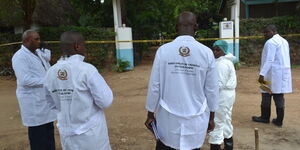In 1960, Jaramogi Oginga Odinga had hatched a plan to exclude Tom Mboya from a conference in which one national party would be launched.
The outfit was to be named Uhuru Party but would later change its name to Kenya African National Union (KANU) in fear of the colonial government declining to register a nationwide party,
Odinga ensured that all other elected leaders apart from Mboya had signed the agreement. However, the first Vice President made a tactical blunder two days before the conference that rescued Mboya from possible political obsoletion.
He released a list of Uhuru Party officials which only had Ronald Ngala, Jeremiah Nyagah and James Gichuru names. Shortly after the list was released, both Ngala and Nyagah denounced it while Gichuru said he had been misled by Odinga. They had signed on the assumption that Mboya would be included.
It was at Julius Gikonyo Kiano’s house in Riruta, Nairobi, that a meeting had been called for all elected leaders in 1960 to launch the party.
Odinga did not invite Tom Mboya to this meeting which was also attended by James Gichuru, Arthur Ochwanda, Dr. Kiano, and Argwings-Kodhek. Mboya only came to learn about the meeting when a journalist took to him a photocopy of the signed agreement.
On seeing the signed agreement, and noticing Dr. Kiano’s name among the leaders, Mboya knew that all his allies had deserted him.
“The meaning of Odinga’s plan was patent: It was to shut Mboya out from any position of leadership in the main organ of Kenya nationalism,” wrote Mboya’s biographer David Goldsworthy in his book Tom Mboya: The Man Kenya Wanted to Forget.
The reason the May 1960 meeting, which saw the birth of KANU, was held in Limuru was because of fear that the rivalry between Mboya’s Nairobi People’s Convention Party (NPCP) and Argwings-Kodhek’s Nairobi African District Congress (NADC) would turn bloody.
The two had outsmarted everyone else on Nairobi politics and Odinga’s fear was Mboya was a stooge of the Americans. As Odinga would later write in his autobiography Not Yet Uhuru, Mboya “was interested in his own ascendancy to power” by using his “unlimited supplies of foreign money”.
Mboya knew that if his NPCP party skipped the Kiambu meeting, he would be roasted by Odinga.
“By the time of the Kiambu conference, however, Mboya’s supporters had convinced him that he would lose support if he isolated himself from the national party and so he came to the conference,” Odinga wrote in his book.
The importance of this political episode was that it would shape KANU going forward and the alliances that emerged would later transform the country’s politics. It also ensured that Mboya remained in KANU and became a key figure in both the party and country’s political shaping.












